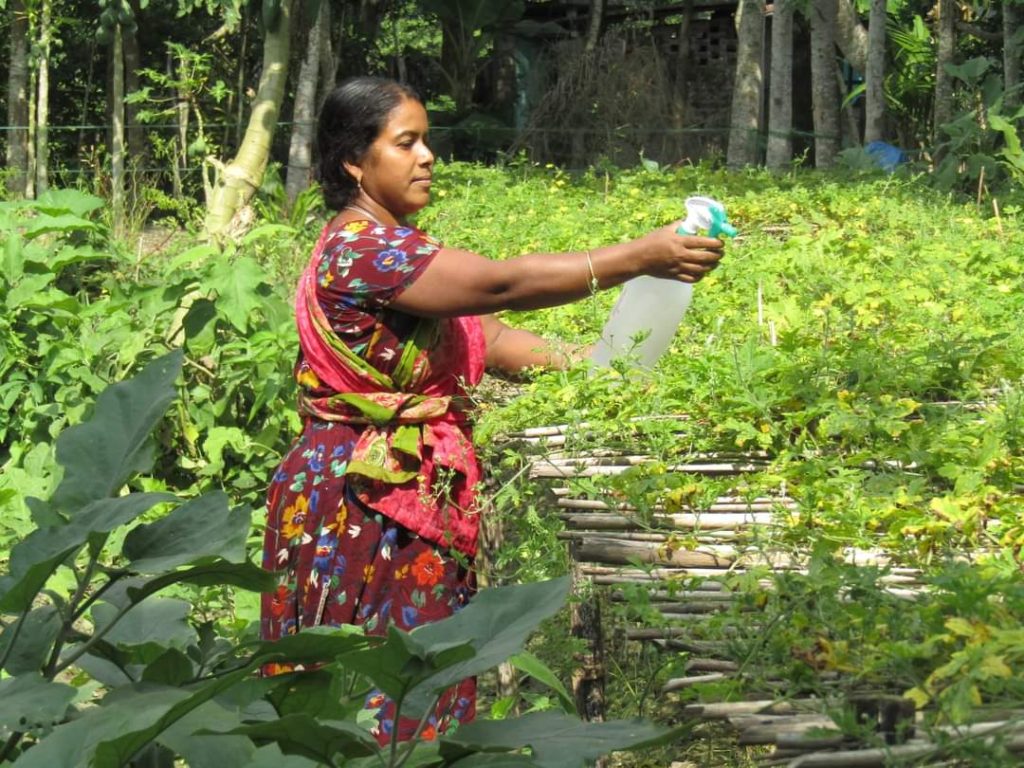
Ms. Champa Palma (40) and her husband, Mr. Litton Corraya (50) are a small farmer couple. They live in Bhabanipur village of Baraigram Upazila of Natore district. Champa has three children. The elder daughter was married off last year. Her second daughter Bristi Corraya (19) studies in the college and her youngest son Pius Corraya studies in class five at the village primary school. Champa herself came from a low-income farmer family, and could only up to class eight. She got married when she was 18 years old and moved to her husband’s family. She has devoted herself to household and household chores. The husband owns 25 decimal of land that out of which 20 decimal is cultivable. Income that they earn from that small piece of land is spent on the family and children’s education.
Champa and her husband have been doing farming for a long time, but they were also under a huge debt. It started becoming difficult for them to run the low-income family and provide for regular nutritious food for the children. After joining the SAFBIN programme in July 2018, smallholders like Champa of Bhobanipur village started improving their food and nutritional security while also being climate change resilient. They started realizing that many smallholders face similar challenges of poverty, disaster, and illness. Most importantly, they realized that the food that they grow is not just about production but should also be nutritious and safe.
Champa started attending various training programmes on Integrated Farming System (IFS) organised by SAFBIN that helped her conduct On-Farm Adaptive Research in her farm. She became aware of many possible connections between the farm components, and greater the number of connections meant more production in the farm. Training on recycling, re-using, and up-cycling helped her and many to convert farm waste and kitchen waste into manure.
The use of farm materials such as cow dung and urine, kitchen leftover, etc. are now being used to prepare organic pesticides, organic manure etc. Champa has now prepared a modern compost pit in her backyard to prepare organic manure at home. She regularly dumps the decaying materials from the farm into the pit and uses the ready manure back into farm. Cow urine is now being preserved which is used as organic pest repellents in the farm especially on the vegetables.
As part of research on IFS, Last year, they built vegetable garden on their small land near their house and they cultivated varieties of crops like red spinach, spinach, carrot, radish, eggplant, etc. As experiment on their homestead, they used only farm compost and organic pest repellents instead of chemicals pesticides and saw great difference in the quality and taste of the vegetables. They also started inviting the Upazila Agriculture Extension officer to give them suggestions and schemes in their Smallholder Farmer committees (SHFCs) meetings.
Champa`s husband now takes vegetables to the neighbouring market twice a week to sell the surplus produce. Last year the family produced about 1440 kg of vegetables from the farm. That was about one and a half times higher than before they joined SAFBIN. They now earn around Taka 21,300 by selling the surplus.
“Now I’m committed to produce safe food for me and my family. We will produce safe crops and eat ourselves and share with neighbours regularly. I encourage all neighbours to produce safe crops” says Champa. She suggests that this knowledge should be spread to a wider range so that consuming safe food will benefit many people She expressed her gratitude and thanks to the programme and Caritas Bangladesh supporting her in the production of safe food crops.